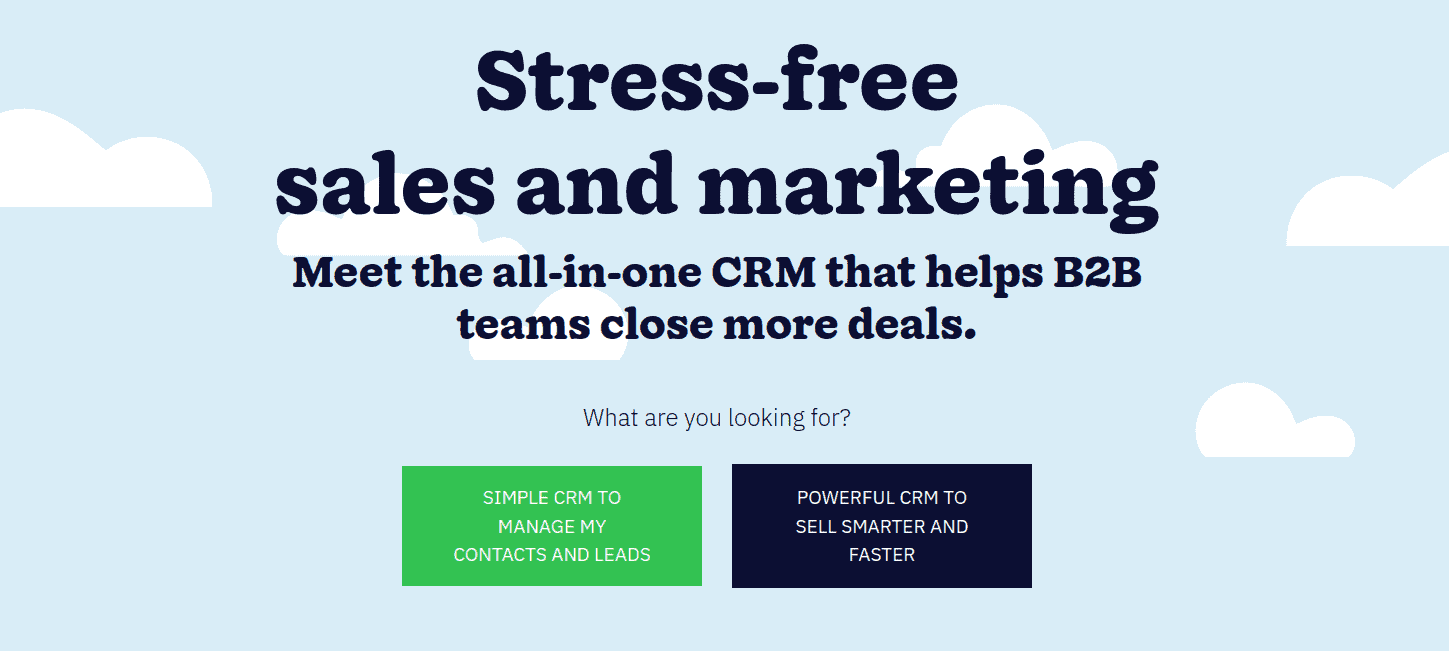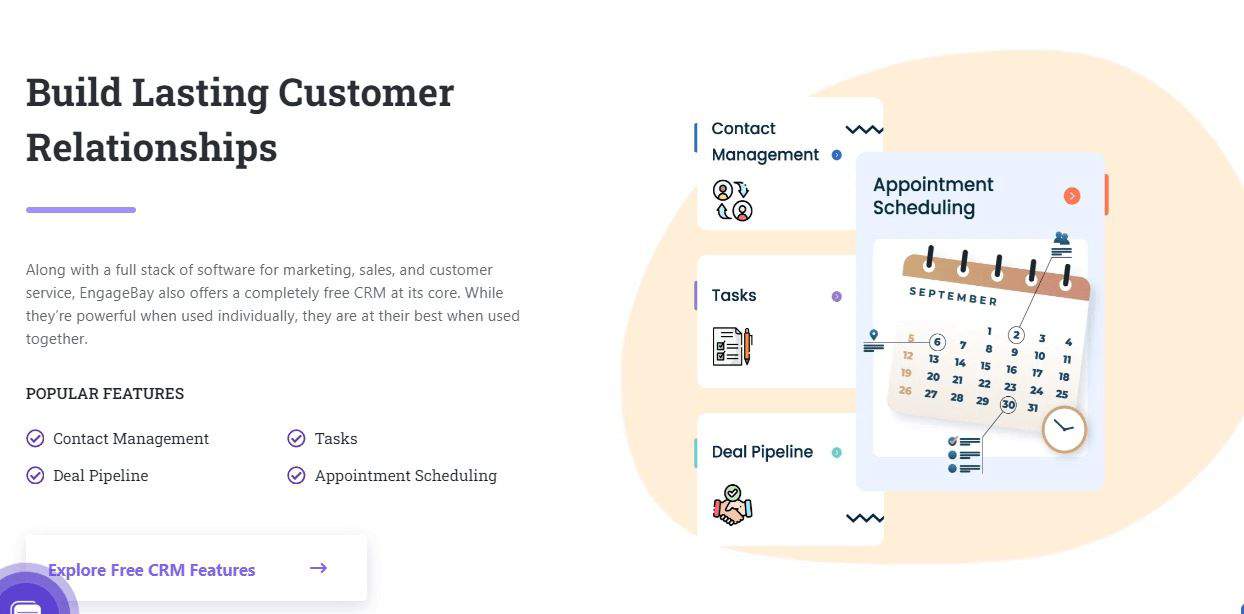A manufacturing CRM system uses real-time customer and product data to give industries valuable insights and reports into overall business performance. It serves as a central hub for processing company data to improve lead nurturing, sales forecasts, and inventory management.
Manufacturing businesses handle rigorous tasks from processing to packaging, testing, distribution, record keeping, and post-sales operations. Generally, these are tedious and time-consuming activities, and companies that don’t use advanced business technologies may likely struggle with low data quality, poorly integrated systems, and poor supply chain management.
This article explores the essential features and benefits of CRM applications in manufacturing. You will learn how to use tailored sales platforms to improve production planning and supply chain management. We also have a list of recommended manufacturing CRM solutions for your organization and a few steps to help you incorporate CRM into your manufacturing processes.
Table of Contents
What is the Role of CRM in Manufacturing?
Customer relationship management software enables manufacturing companies to store and process customer information from the first point of contact to closing a deal. The systems manage and record all contacts and communications across multiple channels.
So, more than having a customer information database, a manufacturing CRM lets you generate valuable insights for optimizing your sales processes, improving customer service models, and providing strategic integrations with other third-party programs. A recent study surveyed manufacturing industries to evaluate the impact of CRM on productivity.
The results? 42% reported improvement in implementing repetitive tasks, and 39% said their employee productivity improved significantly.
Unlike conventional CRM tools, manufacturing CRMs are more tailored to helping businesses build lasting relationships with prospects by ensuring streamlined and error-free data management processes. This enables companies to develop personalized and optimized services to prospects without getting overwhelmed with big data or other demanding activities.
On this note, CRMs tailored to manufacturing industries will support app extensions for inventory management, accounting, payment processing, enterprise resource planning (ERP), order management, eCommerce, and customer support. This will enable businesses to connect and manage data across several platforms.
6 Great Manufacturing CRM Software to Try Today
We have selected six essential CRM tools for manufacturing companies across several industries. They possess unique functionalities that are fit for businesses of varying sizes and structures.
1. EngageBay
If you’re looking for an affordable CRM solution for small and mid-sized businesses, EngageBay is your go-to option. It is an all-in-one platform that offers suitable solutions for sales, marketing, and support teams. With several advanced automation tools and flexible pricing, EngageBay stands out as a winning choice for manufacturing businesses on a low budget.
The basic CRM plan starts at $11 per month for 500 contacts. It also has a free version and offers a 14-day free trial period. Manufacturing industries can use EngageBay to track multiple deals, score leads, schedule appointments, manage roles, automate sales processes, and generate custom reports.
EngageBay is easy to use, and with helpful articles and product guides, you can easily customize the platform to fit your industry model. Moreover, customer support is responsive and proactive, so even when you encounter issues, the service team can provide relevant and timely solutions.
One major drawback with EngageBay is its limited customizability options and a few templates. However, you can still build custom templates from scratch with the HTML or drag-and-drop builder.
Related blog: The Top 13 Engagebay Alternatives Of 2024 [Features, Pricing]
2. Zoho CRM

Manufacturers can build lasting relationships with suppliers, vendors, and customers using Zoho CRM. The online CRM software lets you manage marketing, sales, and service capabilities in one platform, bringing your customers closer to you and building excellent relationships through the right channel at the right time.
At $14 per month, Zoho CRM provides manufacturers with pipeline management features, sales forecasting, sales management, product customization, workflow automation, process management, and predefined reports. Unfortunately, there’s no free plan. However, it supports a 30-day free trial version on all plans.
Zoho CRM is well-suited for small businesses and startups. It’s easy to use and has excellent customer support. One major drawback is its pricing model. There is no free plan, and the reporting feature lacks flexibility.
Related blog: Zoho Alternatives: 15 Crm Solutions For Smart Sales Teams
3. HubSpot

Not many CRM applications are as comprehensive and diverse as HubSpot. Like EngageBay and Zoho CRM, HubSpot is an all-in-one CRM system supporting several business operations from one platform. It is an ideal option for manufacturers across several industries, as it provides tailor-made sales solutions to help you grow prospects and increase revenue.
The basic CRM plan starts at $20 monthly with a free forever version. The CRM, however, doesn’t support free trials. Manufacturing industries can use HubSpot’s comprehensive reporting dashboard to produce valuable real-time analytics for performance evaluation. Other features may include mobile optimization, marketing automation, list segmentation, dynamic personalization, etc.
HubSpot has a knowledge base containing comprehensive how-to guides, helpful articles, videos, webinars, etc., to simplify its structure and help you make the most out of the tool. One major drawback, however, is its steep pricing, so it may not be the most affordable alternative for businesses.
Related blog: Is HubSpot worth it? An in-depth HubSpot review for small businesses
4. Salesforce

If you’re looking for an advanced and extensive manufacturing CRM with comprehensive solutions to level up your sales and distribution teams, Salesforce is your best bet. Built for enterprise organizations, Salesforce provides Manufacturing Cloud, a robust CRM designed to deliver predictability and transparency to your manufacturing business.
It empowers your sales, operations, finance, and product teams to collaborate and respond quickly to shifts in demand. It also enables visibility across new and existing revenue streams and provides a unified forecast to predict demand across your ecosystem better.
Manufacturing Cloud starts at $50 per month. There’s no free version, but you can access all plans for 30 days with the free trial. Some features include sales agreement management, advanced forecasting, program-based business, and visit management.
While Salesforce stands out as a sophisticated CRM for manufacturing industries, its pricing structure makes it unfit for smaller businesses on a tight budget.
Related Blog: Top 9 Salesforce Competitors And Alternatives [Comparison Tables]
5. Nutshell

A flexible and user-friendly CRM solution like Nutshell supports well-suited features that enable you to drive sales and grow your manufacturing business. Nutshell is a simple but powerful manufacturing CRM offering effective communication solutions and other tailored capabilities for engaging leads and prospects.
Nutshell costs $16 per month and supports a 14-day free trial. There is no free plan. Some Nutshell features include sales reports, web forms, hot leads, multiple pipelines, map views, and other tailored tools designed to help you manage client relationships.
The platform streamlines your sales processes by designing automation workflows to eliminate repetitive, manual, and time-consuming tasks. This lets you stay engaged with current and potential clients while prioritizing leads and fostering brand loyalty.
Although Nutshell CRM is simple and easy to use, it has limited integration capabilities.
Read also: The Perfect Nutshell Alternative
6. Pipedrive

Pipedrive’s manufacturing CRM provides a 360-degree view of your customers to improve operational efficiency across the board. It supports essential features that let you gather and analyze customer data, track inventory, forecast demand, and drive revenue.
The analytics hub provides valuable insights that enable you to monitor new and existing customers to upsell products and increase retention rates. Moreover, you can stay organized by importing your data to gain an aerial view of order activity, identify specific patterns, and optimize your process to align with the current trends.
Pipedrive starts at $9.9 per month with a 14-day free trial period. There is no free version. Like many other CRM platforms, Pipedrive uses add-ons to extend its functionalities and help you achieve more with the tool.
Pipedrive is a user-friendly and affordable CRM system with AI-powered functionalities. However, it has a few integration issues and limited campaign tools. Since it doesn’t support a free plan, businesses only have 14 days to try the features and see if they fit.
Related Blog: Pipedrive Pricing, Features, And Affordable All-In-One Alternatives
Benefits of Implementing Manufacturing CRM
A tailored and well-built CRM software is essential to your tech stack. It provides helpful features for ensuring healthy client-customer relationships. Here are some of the benefits of choosing a suitable manufacturing CRM.
1. Enhanced customer insights
A customer relationship management system provides valuable customer insights and accurate reports revealing how customers interact with your organization. From the point of first contact to closing a deal, some CRM solutions use predictive modeling to forecast prospect behavior and identify potential business opportunities.
2. Better demand forecasting
CRM applications also use real-time client data to predict the demand for a particular product. Timely and accurate reports provide businesses with the correct information to understand what appeals to prospects the most within a given period. This way, businesses can create more optimized offers and products to attract buyers.
3. Improved sales pipeline management
A manufacturing CRM helps you visualize your sales pipeline and track prospects in the sales funnel. It automates this process, helping you generate qualified leads for targeted marketing. Moreover, it enables you to assign tailored sales activities at each stage of the sales process, giving your leads timely and appropriate offers that suit their positions in the sales funnel.
4. Better customer service
A customer relationship management system provides accurate customer data to show how users relate and interact with your company. These interactions reveal specific patterns and trends over time. So, whether you’re solving a problem, addressing an issue, closing a ticket, or providing information, CRM systems give you sufficient information about the customer to provide tailored, effective, and quick assistance.
5. Enhanced integration capabilities
Manufacturing CRMs support targeted integrations with other related applications to extend functionalities and improve operational efficiency. A streamlined workflow is enabled when production and supply chain systems are successfully integrated. Moreover, you can seamlessly connect your data to ensure consistency across all platforms, systems, and locations.
Read also: CRM For Construction: 8 Top Tools And What They Do Best
Key Features of Manufacturing CRM
All CRMs have advanced features, supporting unique solutions for businesses with varying needs. However, there are vital features every manufacturing CRM must have to ensure streamlined business operations across multiple systems. Some of these features include:
1. Contact/Account Management
The contact management feature allows you to collect and manage customer data from web forms, socials, landing pages, emails, and surveys. This data may include phone numbers, names, email addresses, etc. Usually, manufacturing corporations combine personal data with behavioral data to understand customers’ positions in the sales funnel and how they interact with the brand.
Managing contact data involves gathering, storing, organizing, and tracking essential customer, prospect, or sales lead information. This enables you to create personalized offers and promos to contacts based on their unique attributes. So, before adopting a CRM tool, ensure it supports a robust contact management feature that lets you segment your lists and create unique personas for each user.
2. Pipeline Management
Businesses use the pipeline management feature to coordinate prospects and leads throughout the sales cycle. It gives sales teams visibility into the sales process, allowing them to focus on qualified leads and improve follow-up strategies.
Proper sales pipeline management optimizes sales processes, shortens the sales cycle, removes unwanted leads, and improves sales performance, thus streamlining your operations to reach new audiences and increase revenue.
3. Integrations
CRM platforms, though extensive, have several limitations, as they cannot handle all business functionalities. From inventory tracking to payment processing, accounting, order management, and shipping, manufacturing industries require additional applications that amplify their operations and streamline processes.
Your manufacturing CRM should support seamless integrations with these third-party programs. This provides a smooth consolidation of your business and contact data across several platforms to ensure consistency and completeness.
4. Sales Automation
The sales cycle is a comprehensive structure involving operations like lead generation and nurturing, sales forecasting, asset management, appointment scheduling, etc. Your CRM system supports functionalities that let you run these activities on autopilot.
A streamlined sales process leads to building simple and profitable customer journeys, faster-closed deals, improved sales productivity, and effective team collaboration. Choosing a platform with advanced sales automation features gives you the flexibility to attract and prioritize qualified leads to improve sales.

5. Analytics & Reporting
Real-time analytics and reports enable businesses to track their performance over time and evaluate the effectiveness of their operations. This feature uses historical and current data to identify specific patterns and trends in your industry, providing opportunities for making critical business decisions and strategic improvements.
Usually, major CRM systems support real-time data capturing and analytics with visual dashboards to help you track key metrics and identify trends in customer behavior.
6. Team Collaboration
Another important feature of manufacturing CRMs is a single unified platform that grants team members access to customer data. The CRM system serves as a central access point for teams across multiple departments, enabling them to share data, manage projects, and enhance communication.
Your manufacturing CRM lets your sales teams work together on critical projects by assigning tasks, scheduling appointments, moving tasks, and tracking project statuses.
Read also: The Power of Integrating CRM Software and Marketing Automation
6 Steps to Incorporating CRM Into Your Manufacturing Operations
Now, let’s get into this step by step.
Identify your business needs and goals
Manufacturing industries deliver various products for varying purposes, from aircraft to automobiles, clothing, household equipment, and electronics. Understanding your core offerings and target audience is key to crafting well-planned goals and objectives.
These goals depend on your business size, budget, and other factors influencing your operations and processes. Also, your goals keep you focused, helping you craft refined processes unique to your business model and structure.
So, before choosing any CRM for your manufacturing business, define your goals clearly and ensure they correctly align with the provisions of the CRM, no matter how sophisticated it is.
Create a solid framework
Your goals enable you to develop well-planned strategies, structures, and processes for making the most out of your CRM platform.
Creating a solid blueprint for your CRM platform involves mapping customer journeys, defining your target audiences, and developing a system to connect and maximize your business applications for profit.
Choose a platform
From your goals and strategies, you can adopt a suitable CRM system that supports the necessary functionalities to interact with customers and manage information.
Several CRM platforms are built for different purposes and have diverse functions. Factors that influence your choice of a CRM platform include
- Pricing
- Scalability
- Integration capabilities
- Features
- Target market
- Customization
- Ease of use
- Customer support
- The onboarding process, etc.
Considering these and many more criteria will help you identify and adopt a more suitable program tailored to your business needs. These needs are hinged on your manufacturing, administrative, and other business processes.

Connect with other systems
Since your industry involves many moving parts, it’s essential to consider other business applications related or unrelated to CRM.
These applications may include payment processors, order management platforms, scheduling apps, emailing tools, customer service software, inventory tracking programs, etc.
So, before you choose a CRM solution, ensure it supports quick and smooth connections with the third-party apps you use. This will ensure a smooth data flow without interruptions from one platform to another.
Assign roles to team members
Your sales team carries out diverse operations and works together to ensure a smooth and efficient sales cycle from lead acquisition to customer retention. Manufacturing CRMs are complex systems with advanced features, so you need an onboarding plan to train and assign responsibilities to team members. This way, they can collaborate easily and work together to complete projects.
Most CRM providers include valuable resources that simplify the onboarding processes. However, an internal training material, guide, or documentation ensures uniformity and consistency across boards, even when you migrate to a different platform.
Track performance and make adjustments
The last implementation step involves performance tracking and evaluation. No matter how successful your processes are, there is always a need for improvement since your industry is ever-evolving and customers’ demands are changing.
You can track specific metrics influencing your business growth using the analytics and reporting feature and other essential tools. These metrics also reveal your customers’ behavior and interactions across multiple touchpoints.
Other ways to track your progress involve using surveys or feedback forms or gathering reviews and suggestions from team members. These steps provide valuable insights into the overall performance of your operations within a defined timeline.

Read also: 11 Best CRM Tools for Architecture Firms
Drive Sales With an All-in-one Manufacturing CRM Software
Your manufacturing CRM software uses both customer and business management processes to simplify your operations, giving you more time to focus on building profitable client relationships. More than storing vendor or supplier data, other valuable tools like marketing automation and reliable support enhance customer engagement and communication.
By promoting relevant and timely offers, you can attract more prospects who are ready to buy. So, whether you’re new to CRM solutions or planning to upgrade to a more advanced platform, you can start by choosing from our recommended list of well-suited CRMs for manufacturing industries.
Ultimately, we recommend EngageBay for small and mid-sized companies. As an affordable option, you can deliver optimized sales and marketing campaigns on a low budget. Sign up for free or book a demo to get started.
Frequently Asked Questions
What are manufacturing CRM best practices?
Best practices and strategies for manufacturing CRMs include:
- Establish clear guidelines for maintaining data quality and security
- Adopt a customer-focused strategy
- Provide adequate training for effective CRM use
- Align your processes to business goals and needs
- Use accurate real-time analytics to make informed data-driven decisions
- Design smart automation workflows
What factors should I consider before choosing a manufacturing CRM?
Factors to consider before adopting a manufacturing CRM solution include:
- Pricing
- Scalability
- Integration capabilities
- Features
- Target market
- Customization
- Ease of use
- Customer support
- The onboarding process


